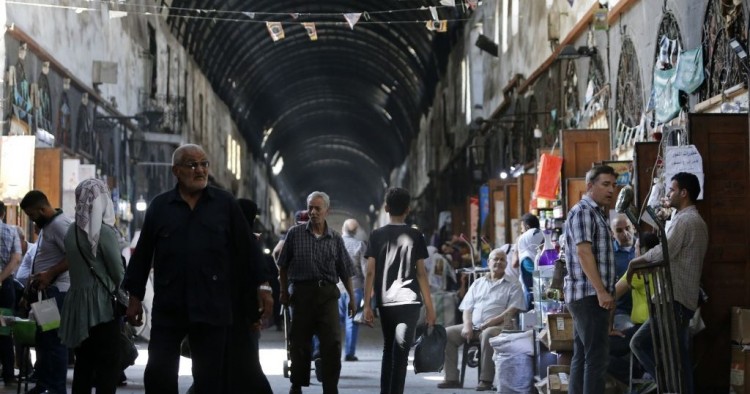The Caesar Syria Civilian Protection Act went into effect on June 17 with the aim of curbing the Assad regime’s ability to wage war against its people and to compel it to take tangible steps, including releasing political prisoners and engaging more seriously in the political process. The Caesar Act, which received strong bipartisan congressional support, is named after the individual who documented torture against tens of thousands of civilians by Assad’s government.
The Caesar sanctions, if implemented fully, will become the strongest ever applied against Syria, because they include third-country actors who conduct business with the regime or entities that are known to support its ability to wage war. To date, the regime has used a web of shell companies and third-party actors to bypass existing U.S. and European sanctions, as well as outright violations of those sanctions by allies Russia, China, and Iran. The Caesar Act can greatly limit the regime’s ability to access hard currency or to attract foreign investment, even from its allies, by imposing sanctions on countries, companies, and individuals that provide such support. Among its many targets, the law includes prohibitions on dealing with Syria’s oil and gas sectors as well as the sale of aircraft and spare parts, which may reduce the regime’s ability to bomb civilians.
The Caesar Act arrives at a time of unprecedented economic turmoil in Syria that includes severe currency depreciation vis-à-vis the dollar from 700 Syrian liras in May to close to 3,000 in June. The regime reportedly lacks the necessary funds to purchase heating oil or wheat, and public displays of dissatisfaction have mounted from within its ranks as well as from formerly quiet areas such as the province of Sweida. Even areas that it subdued militarily thanks to Russian help, such as Daraa, are experiencing a resurgence of anti-regime activities and attacks.
While the regime and its allies have cast the current crisis as the result of Western sanctions, Syria’s economic troubles are largely due to the regime’s “Assad or we burn the country” policies that included the willful destruction of the country's infrastructure and displacement of half of its population, including from key commercial hubs such as Aleppo. Moreover, the billions spent during the course of the war by Russia and Iran to ensure regime survival came in the form of guided munitions that levelled hospitals and stipends for Shi’a militias from Iraq and Afghanistan — all contributing to the economic meltdown confronting the country.
The ball is now in the regime and its backers’ court, and whether these pressures will finally convince them that the military phase of the conflict has ended, and that a more serious engagement on the diplomatic track is in order.
Wa'el Alzayat is a non-resident scholar at MEI and the CEO of Emgage Foundation. The views expressed in this piece are his own.
قانون "سيزر" في سوريا يتزامن مع أزمة اقتصادية غير مسبوقة
دخل قانون " قيصر" لحماية المدنيين سوريا حيز التنفيذ في 17 يونيو الجاري بهدف الحد من قدرة نظام الأسد على شن الحرب ضد شعبه، وإجباره على اتخاذ خطوات ملموسة، بما في ذلك إطلاق سراح السجناء السياسيين والانخراط بشكل أكثر جدية في العملية السياسية. تسمية القانون ب"قيصر" جاء تيمنا باسم الشخص الذي وثـق التعذيب ضد عشرات الآلاف من المدنيين من قبل حكومة الأسد.
وقد حظي القانون بدعم قوي من الحزبين الجمهوري والديموقراطي في الكونغرس الأمريكي.
ولإذا ما تم تطبيق عقوبات قانون "قيصر" بالكامل، فإنها ستصبح الأقوى على الإطلاق ضد سوريا، لأنها تشمل أطرافًا من دول ثالثة تتعامل مع النظام، أو كيانات معروفة بدعم قدرتها على شن الحرب.
وقد استخدم النظام حتى الآن شبكة من الشركات الوهمية والجهات الخارجية لتجاوز العقوبات الأمريكية والأوروبية الحالية، وكذلك الانتهاكات الصريحة لتلك العقوبات من قبل حلفاء روسيا والصين وإيران. ولكن قانون "قيصر" يمكن أن يحد بشكل كبير من قدرة النظام على الوصول إلى العملة الصعبة، أو جذب الاستثمار الأجنبي، حتى من طرف حلفائه، عبر فرض عقوبات على الدول والشركات والأفراد الذين يقدمون مثل هذا الدعم.
ومن بين أهداف القانون المتعددة، ضمان حظر التعامل مع قطاعي النفط والغاز السوريين، وكذلك بيع الطائرات وقطع الغيار، مما قد يقلل من قدرة النظام على قصف المدنيين.
تم إقرار قانون "قيصر" في وقت من الاضطراب الاقتصادي غير المسبوق في سوريا، والذي يتضمن انخفاضًا حادًا في العملة الصعبة، إذ ارتفعت قيمة الدولار مقابل الليرة السورية من 700 في مايو، إلى ما يقرب من 3000 في يونيو. وتشير مصادر متعددة إلى افتقار النظام للأموال اللازمة لشراء زيت التدفئة أو القمح، ما أدى إلى تصاعد أصوات الاحتجاج من داخل النظام نفسه، وأيضا من مناطق كانت هادئة سلفا مثل محافظة السويداء، بل إن مناطق نجح النظام في إخضاعها عسكريًا بفضل المساعدة الروسية، مثل درعا باتت تشهد عودة للأنشطة والهجمات المناهضة للنظام.
وفيما يرجع النظام وحلفاؤه الأزمة الحالية للعقوبات الغربية، فإن المشاكل الاقتصادية السورية ترجع إلى حد كبير إلى السياسة التي اتبعها النظام والتي تتلخص في"الأسد أو نحرق البلاد"، والتي تضمنت التدمير المتعمد للبنية التحتية للبلاد، وتشريد نصف السكان، بما في ذلك سكان المراكز التجارية الرئيسية في البلاد مثل حلب.
وعلاوة على ذلك، فإن المليارات التي أنفقت خلال الحرب من قبل روسيا وإيران لضمان بقاء النظام جاءت على شكل ذخائر موجهة للميليشيات الشيعية من العراق وأفغانستان، وكلها ساهمت في الانهيار الاقتصادي الذي يواجه البلاد.
الكرة الآن في ملعب النظام ومؤيديه، وما إذا كانت هذه الضغوط ستقنعهم أخيرًا بأن المرحلة العسكرية من الصراع قد انتهت، وأنه قد حان موعد إطلاق المسار الدبلوماسي.
الكاتب: وائل الزيات، باحث في معهد الشرق الأوسط
Photo by LOUAI BESHARA/AFP via Getty Images
The Middle East Institute (MEI) is an independent, non-partisan, non-for-profit, educational organization. It does not engage in advocacy and its scholars’ opinions are their own. MEI welcomes financial donations, but retains sole editorial control over its work and its publications reflect only the authors’ views. For a listing of MEI donors, please click here.













